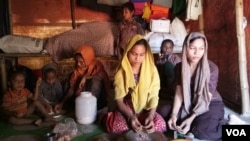A military-backed court in Myanmar has reportedly sentenced 112 Rohingya Muslim refugees to jail terms after they were caught traveling outside refugee camps, as the entire group was on its way to Malaysia.
The state-run Global New Light of Myanmar reported on January 10 that the Bogale township court sentenced the group of “Bengalis”— a pejorative the authorities in the country use to identify Rohingyas — to two to five years imprisonment on January 6 for traveling “without legal documents.”
The court gave jail terms of two years to five children who were under 13. Seven children older than 13 were sentenced to three years. The rest — 53 men and 47 women — were sentenced to five years’ imprisonment, according to the report.
The group of 112 was arrested from around the shores of Bogale township in the southern Ayeyarwady region of Myanmar by the Ayeyarwady Region Police Force on December 20, after they had landed from motorboats, the state media reported.
Fleeing persecution
Upwards of 1 million Rohingya Muslims live in congested shanty colonies of Cox’s Bazar, Bangladesh, after fleeing persecution and violence in Buddhist-majority Myanmar.
In Cox’s Bazar, the Rohingyas live in prison-like conditions, with little opportunity for education or livelihood. Refugees from Bangladesh have for years sought to go to work and live in Malaysia. Using boats operated by human traffickers from Bangladesh, Rohingyas have traveled to Malaysia for many years along illegal sea routes.
Activist groups tracking the movement of Rohingyas report that in recent years many refugees from Bangladesh cross over to Myanmar during the first leg of their illegal journey to Malaysia. With the help of the traffickers, some among them traverse the entire stretch of the journey to Malaysia by land. Some others choose a mixed land-and-sea route to sneak into Malaysia.
However, it is not clear if all members of the group of 112 — who were arrested in Bogale township and jailed — came from Cox’s Bazar or if some in the group were from Rohingya villages or camps inside Myanmar.
According to Cox’s Bazar-based Rohingya activist Mohammad Hossain, at least 5,000 Rohingya from Bangladesh entered Myanmar in the past two years, aiming to finally make it to Malaysia.
“More than half of them were somehow arrested in Myanmar, and now all of them are in custody there. After being intercepted by police in Myanmar, sometimes traffickers pay bribes and manage to get the Rohingyas freed. But in situations where bribes do not come into play for several reasons, Malaysia-bound Rohingyas are ending up in jails in Myanmar,” Hossain told VOA.
“In Myanmar, the members of the community have not been regarded as citizens for decades. They have no way to get travel documents like passports or visas. So, they resort to illegal routes to enter Malaysia. By sending stateless Rohingyas to jail for not possessing official travel documents, Myanmar is giving them extremely unjustified punishments.”
'The latest victims'
Daniel Sullivan, senior advocate for Human Rights at Refugees International, said the Rohingya who are being sent to jail for traveling without proper documents are “just the latest victims of the genocidal policies of the military junta in Myanmar.”
“It is the conditions placed on the Rohingya by the junta in Myanmar, including the denial of their citizenship, that has forced them into this predicament. The million Rohingya refugees in Bangladesh, while out of the direct line of fire of the military junta, are also facing dire conditions incentivizing them to risk dangerous journeys by sea,” Sullivan told VOA.
“Concerted global pressure in the form of targeted sanctions [including on oil and gas and aviation fuel], an arms embargo, and support for accountability measures is urgently needed to get at the root of the crisis affecting the Rohingya and so many other people of Myanmar.”
The Myanmar authorities’ action to imprison Rohingya for not having identity documents is “appalling and outrageous,” Phil Robertson, deputy director of Human Rights Watch's Asia division, told VOA.
“It is precisely the Myanmar government systematically denying the Rohingya access to official recognition and citizenship in the first place for which they are not in possession of identity documents. Furthermore, jailing children for simply accompanying their family on a voyage is so heartless and cruel that it really defies description,” Robertson said.
“What’s clear is the Myanmar junta doesn’t view the Rohingya as being truly human, which is something incoming ASEAN [Association of Southeast Asian Nations] chair Indonesia should be considering as it considers how to approach Myanmar to compel the restoration of democracy and respect for human rights," he said.







